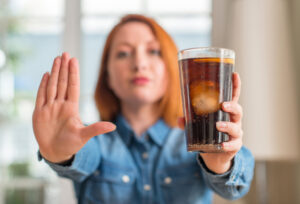We all know that it’s important to stay hydrated in order to stay healthy. Even to stay alive. Still, wetting your whistle requires making a choice: Coffee or tea? Soda or a sports drink? Red wine or white? You have to drink something, sometime, so while we at Stiles Dental Care will never suggest that you stop drinking, we do suggest that you think about what you drink, how much you drink, and how what you drink affects your oral health. Here’s the lowdown on some common beverages to help you make your choices smart.
Soda/Pop/Soft Drink

Soda contains acid, and acid, over time, can erode tooth enamel, making teeth sensitive to cold and heat, and prone to decay. Soda is also loaded with sugar, which is linked to tooth decay. Diet sodas are marginally better because they have less sugar, but they’re still problematic. Finally, the carbonation in soda causes you to produce less saliva, the exact thing that coats your teeth and gums in order to repel food debris and protect them from acid and bacteria.
The same characteristics apply to the plethora of sports drinks advertised as healthy. Although they contain vitamins and electrolytes, they’re often full of sugar and most are carbonated. Take a look at their labels. You’ll find that many contain more sugar than a regular soda. When you need to re-hydrate after a game or a workout, try a natural choice: water!
Thinking you’ll switch from soda and sports drinks to carbonated water? That’s a better choice, for sure, but not without concerns. Carbonation is carbonation, whether it’s applied to sweetened and flavored water or to just plain water. Skipping the bubbles entirely is really the way to go.
Coffee
If there’s a question about whether coffee is popular in our country, just count the number of coffee shops you see on the way to work each morning. A cup (or two or three) is a daily ritual for thousands of Americans. Yet coffee is one of the worst liquids you can send over your pearly whites.
Coffee stains your teeth, dries your mouth, and erodes your tooth enamel. Add sugar and it also contributes to tooth decay. In small amounts, it’s simply not good for teeth; if you drink a lot of it, it can be truly damaging. Want to lessen coffee’s impact without giving it up? Dilute its acidity with milk, don’t add sugar, and rinse your mouth with water afterward. If you don’t like milk, pick a coffee creamer with as little sugar as possible.
Tea
After water, brewed tea — if you don’t add sugar! — is as close as you’ll get to a no-risk beverage. In fact, there’s some data to suggest that green tea actually aids in keeping gums healthy and preventing tooth decay. But nowadays, many of us drink store-bought tea and foodservice iced tea. That’s a different story altogether. Tea that’s commercially processed is quite acidic and most bottled tea has at least some added sugar. It can erode your tooth enamel just as coffee does; and, of course, sugar contributes to tooth decay, no matter what beverage it’s in. Better to simply put the kettle on.
Fruit Juice
Most kids love fruit juice. Many adults drink fruit juice. And most of us think that’s a good thing. But, beware. Fruit juice is not without its drawbacks, regardless of the vitamins listed on the label. Fruiting plants pack their gifts with sugar so animals will eat them and their seeds will be dispersed. But while a piece of fruit comes with a good helping of sugar, its sugar is balanced by fiber. Not so with juice.
Most fruit juices — unless you’ve squeezed it out of a piece of fruit yourself — are packed with sugar. And they are typically concentrated, which means they’re more acidic than the source fruit in its natural form. Sugar and acid, as we’ve said before, equals eroded enamel and tooth decay. To help make your favorite juice less fraught with danger for your teeth, we suggest a 50/50 combination: one part water, one part juice.
Wine
It’s fruit juice — usually grape juice — with a kick, so wine comes with the same two negatives as fruit juice: acid and sugar. Plus, alcohol. Therefore, along with eroding tooth enamel and contributing to decay, wine (and other alcoholic beverages) lessens your level of saliva, which dries your mouth. That’s why wine can be a triple threat.
Partial to red wine? Red wine can also stain your teeth. Drink only white wine? Okay, no staining. But white wine is usually more acidic than red. Whichever wine is your weakness, you need to take the same precautions as with other dangerous things you drink. Rinse your mouth after drinking, choose versions with less sugar, and avoid carbonation (i.e., the bubbles in champagne).
So, what’s a sipper to do?
Obviously, you can’t stop drinking liquids in general. And you’re unlikely to choose plain water as the only beverage you swallow. But you can make a difference in your oral health by being aware of the downside of your favorite drinks, and taking steps to minimize their effect. Drink them less often, perhaps, and rinse your mouth with water after you partake. Notice, too, if your teeth become sensitive to certain drinks and be sure to avoid those.
Of course, if you are currently experiencing sensitivity issues, eroded enamel, or tooth decay, it’s already time to contact our office. Our professionals can determine if any damage has been done and what steps we can take together to improve your oral health.
